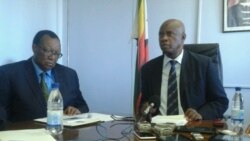Finance Minister, Patrick Chinamasa, says Zimbabwe is targeting an annual growth rate of between six and 10 percent in order to revamp the economy.
Chinamasa says for this to happen, the country must embark on serious policy reforms as agreed under the International Monetary Fund Staff Monitored Program.
Speaking at a meeting organized by his ministry and the IMF, Chinamasa said any policy changes would be difficult to undertake but the country has no option.
“Any reform agenda is painful and I want to acknowledge the road that we have travelled, the journey that we have travelled has been very difficult and is going to remain difficult.”
He said Zimbabwe must pay its debt to the Bretton Woods institutions and mend its relations with international creditors so as to attract new funding to revamp the economy.
“We need to make friends, we don’t need enemies, especially if those enemies, or if you call them enemies, lend you money,” said Chinamasa.
Visiting IMF head of mission, Domenico Fanizza, said Zimbabwe has many options to revamp its economy, adding that for this to happen it must implement reforms now.
“The message is that if we don’t start the transformation now, when are we going to do it. Zimbabwe cannot wait.”
Economist, Ashok Chakravati, echoed the same sentiments, noting that while reforms were critical for the country to move forward, there was strong resistance to change at all levels.
Chakravati said, “We have a lot of vested interests within the structure of government which resists the policy reform, measures of the government itself. There is willingness at the top to change laws, regulations and policies but there is massive resistance all the way down to the local level to bring about this change so I am not sure what can be done.”
Some of the reforms agreed between Zimbabwe and the IMF include compensation for evicted white commercial farmers, the reduction of the public sector wage bill and labor reforms.
According to the IMF, Zimbabwe has met all quantitative targets and structural benchmarks under the third and final review of the Staff Monitored Program.
The IMF board is set to review Zimbabwe’s position in May.






